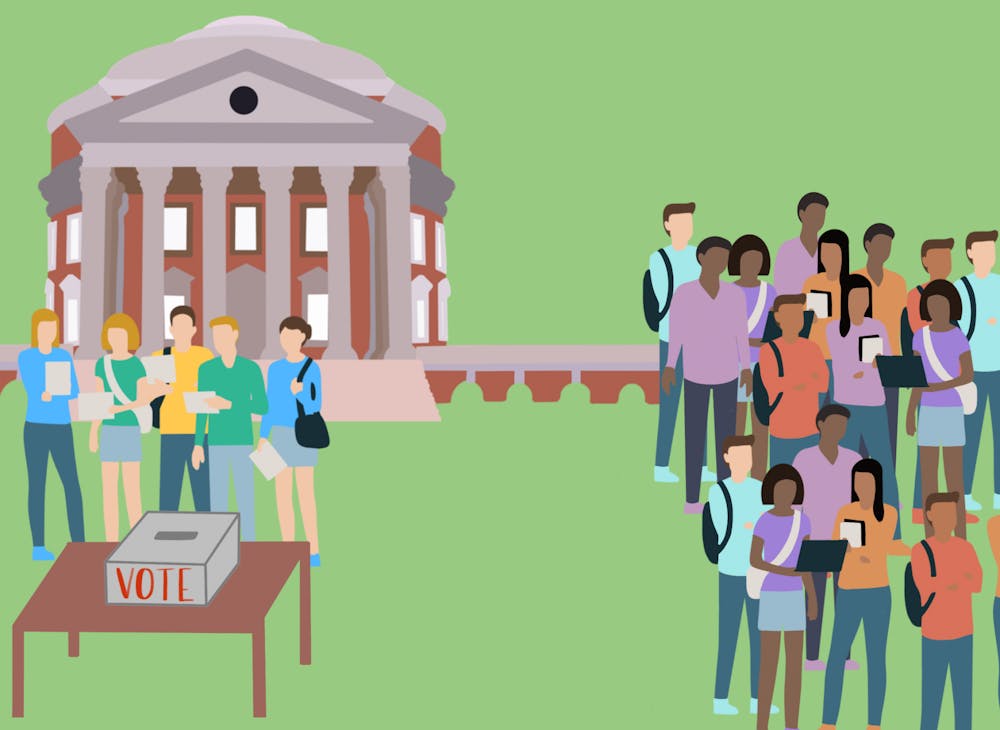Every spring, students around Grounds gear up for another cycle of student elections. Candidates publicize their campaign platforms, University Board of Elections members ensure students are abiding by University regulations and members of the student body prepare to vote for the next cohort of student leaders.
This year, 118 unique candidates are running for various positions on the Honor Committee, the University Judiciary Committee, Student Council and Class Councils and Fourth-Year Trustees. Through these positions, student leaders are able to shape the way the University is run for their fellow students.
This system of student-self governance is a self-proclaimed integral aspect of University life that is plastered on pamphlets, the University website and even mentioned on formal tours of Grounds. However, despite being a source of pride for the University and an interesting talking point for the University Guide Service, many students appear to be apathetic toward the system.
One such student is third-year College student Logan Mercer. Similar to other University students, Mercer was highly involved in student government in high school, but has since ceded the limelight to other students. In addition to his history of leadership positions, Mercer is deeply invested in politics on the state and national level. However, student-self governance at the University has failed to capture his interest in similar ways.
“I think a part of the problem is that I don't know what they're doing on a day-to-day basis,” Mercer said. “I don't know if it helps or hinders me or if it’s making my life easier or not. Most of the things that screw me over are structural, like out-of-state tuition being as high as it is or not having free masks in buildings for when kids forget their masks … But I don't think they have any power over that, so it's like, what decisions are they making that actually affect me?”
Despite his minimal interaction with student-self governance, Mercer still makes a point to vote every year. Most other students cannot say the same. Max Bresticker, chair of the University Board of Elections and a third-year College student, said low voter turnout has been a consistent problem with student elections, with yearly voter turnout averaging around 15 to 20 percent. Last year’s election was an exception to this trend, at around 40 percent voter turnout.
“When you have such a small segment of the University community voting, unfortunately, a lot of opinions are shut out,” Bresticker said. “People who wish to actually see changes from the system don’t have the chance to make their opinions and their voices heard. And I think because of that low turnout, people become jaded towards student-self governance as a whole and think it’s ineffective without giving it the chance to actually impart change.”
As noted by both Bresticker and Mercer, a potential reason for this disengagement is a lack of information and interaction with members of student government organizations.
“At the end of the day, most students may check their inboxes and see a random email from me, from Abel, from UJC or Honor that they may or may not open,” Bresticker said. “I think when that's your only interaction with student governance and that's your only impression of it, your willingness to get involved or willingness to view it beyond just an institution that exists on Grounds is greatly diminished.”
Some marginalized students at the University have detached themselves from organized student-self governance and found alternate ways to build communities that they can more closely identify with. They share sentiments that these historically white institutions do not reflect their interests or compensate them fairly for any kind of efforts to better the University.
Third-year Batten student Gabriel Sirak expressed how marginalized students feel that they can implement more change through their own organizations than through the University’s legislative processes that Student Council must follow.
“With how segregated student life is at the university, getting involved in Student Council or other forms of general student-self governance never felt important to me because marginalized communities here have carved out their own communities and organizations to advocate for themselves,” Sirak said. “I’m much more concerned with who any of the next BSA executives are than I am with the next student body president.”
Sirak noted that the information gap observed specifically by marginalized students on Grounds also plays a role in the lack of representation within student government.
“Really crucial information — whether it's how and where to get involved or the opportunities available to students who do get involved — isn’t something readily and easily available, which acts as a large barrier to students already uncomfortable and unfamiliar with a college environment like U.Va.,” Sirak said. “I think that information gap creates a feedback loop where as a Black student, I am encouraged to distance myself from those institutions as they don’t feel representative of my interests here.”
UBE is attempting to reach out to organizations on Grounds to encourage voting and increase voter turnout and participation ahead of this year’s elections.
“I think there's a long way to go, but I think it’s a big and worthwhile fight to try and change student perception of the impact that student government actually has,” Bresticker said. “I think student governance does play a large role in students’ lives.”







